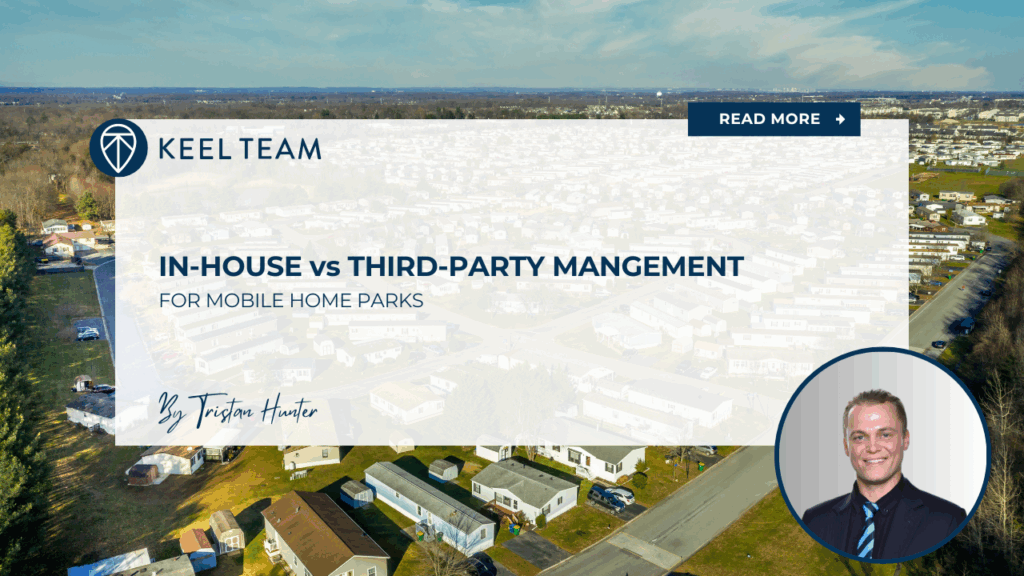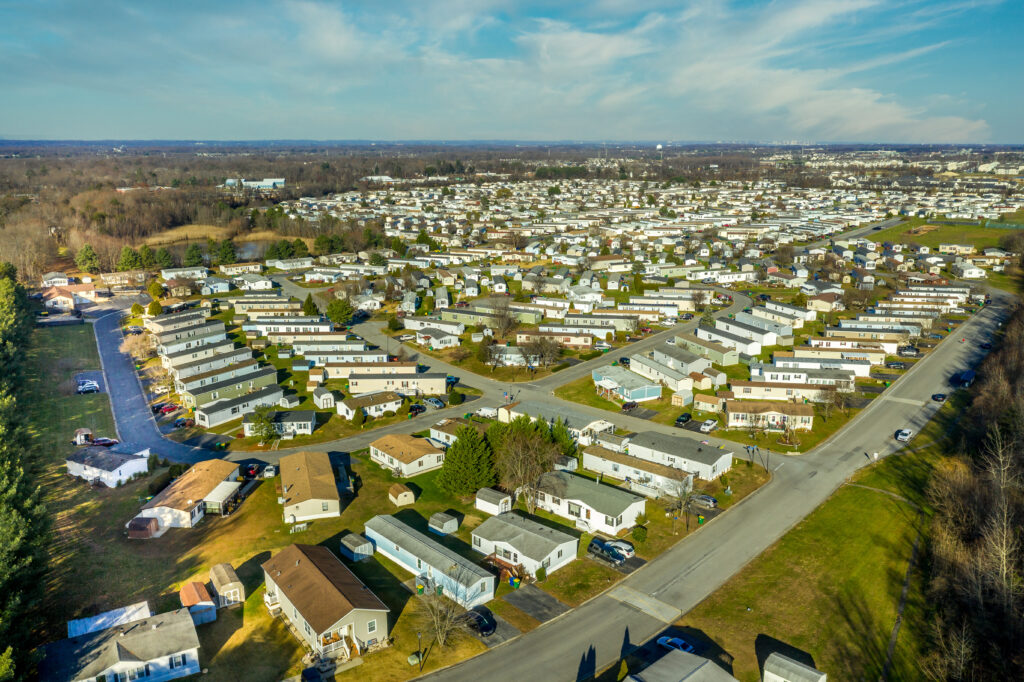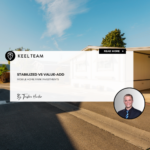In-House vs Third-Party Management for Mobile Home Parks
-
 Tristan Hunter - Investor Relations
Tristan Hunter - Investor Relations

Mobile home park management can make or break your investment. As an owner, you face a critical decision: should you build an in-house team to handle all operations, or hire a third-party management company? Both approaches—vertical integration and third-party management—can offer potentially unique benefits and challenges. This guide explores these options, providing actionable insights to help mobile home park investors choose the path that aligns with their goals. By understanding the pros, cons, and practical considerations, you can make an informed decision to maximize value potential and efficiency.
Understanding Vertical Integration for Mobile Home Parks
What Is Vertical Integration?
Vertical integration means bringing all mobile home park operations under one roof. Instead of outsourcing tasks like maintenance, leasing, or accounting, you hire staff or develop systems to manage them internally. This approach creates a streamlined operation where you control every aspect of the business.
Benefits of In-House Management
Vertical integration offers several advantages for mobile home park owners who want hands-on control. First, you gain complete oversight of operations. By managing staff directly, you can ensure maintenance requests are handled promptly, tenants receive personalized service, and expenses align with your budget. For example, an in-house team might catch a plumbing issue early, saving thousands in repairs.
Second, vertical integration can reduce costs over time. Third-party management companies often charge 5-10% of monthly revenue, plus additional fees for leasing or collections. By eliminating these expenses, you keep more cash flow. Additionally, in-house staff can focus on value-add projects, like upgrading common areas, to boost tenant satisfaction and lot rents.
Finally, you can tailor operations to your vision. Want to implement eco-friendly upgrades or host community events? An in-house team answers directly to you, ensuring your priorities take center stage. This flexibility can enhance tenant retention and attract new residents.
Download our FREE eBook on the Top 20 things to know BEFORE investing in mobile home parks!
Challenges of Vertical Integration
However, vertical integration isn’t without hurdles. Building an in-house team requires significant upfront investment. You’ll need to hire skilled staff, purchase equipment, and develop systems for accounting, maintenance, and compliance. For smaller mobile home parks, these costs might outweigh the savings.
Moreover, managing employees demands time and expertise. Handling payroll, training, and performance reviews can pull you away from strategic tasks like acquisitions or financing. If you lack experience in property management, you might struggle to create efficient workflows.
Lastly, scaling vertically integrated operations can be complex. As you acquire more mobile home parks, coordinating multiple teams across locations may strain resources. Without robust systems, quality control could suffer.
Exploring Third-Party Management for Mobile Home Parks
What Is Third-Party Management?
Third-party management involves hiring a professional company to handle mobile home park operations. These firms take on tasks like tenant screening, rent collection, maintenance, and regulatory compliance, allowing you to focus on ownership and growth.
Advantages of Third-Party Management
Third-party management shines for investors who prioritize scalability and convenience. First, these companies bring expertise. Reputable firms have years of experience managing mobile home parks, so they understand local regulations, tenant dynamics, and cost-saving strategies. For instance, they might negotiate bulk discounts with contractors, reducing maintenance expenses.
Second, third-party management saves time. Instead of fielding tenant calls or scheduling repairs, you can focus on expanding your portfolio or securing financing. This hands-off approach appeals to investors with multiple properties or those new to the mobile home park industry.
Additionally, third-party managers often have established systems. From software for tracking rent payments to networks of reliable vendors, they streamline operations without you building infrastructure from scratch. This can be a game-changer for mobile home parks in turnaround situations, where quick improvements are critical.
Drawbacks of Third-Party Management
On the flip side, third-party management has limitations. Cost is a major factor—management fees can erode your cash flow. Beyond the standard 5-10% of revenue, some firms charge extra for services like evictions or capital project oversight. These expenses can add up, especially for high-performing mobile home parks.
Moreover, you surrender some control. Third-party managers may not share your vision for the property. For example, they might prioritize short-term profits over long-term upgrades, like installing energy-efficient lighting. Misaligned priorities can frustrate owners who want a specific brand or community culture.
Finally, communication gaps can arise. Since you’re not directly managing staff, delays in reporting or resolving issues might occur. If the management company oversees multiple properties, your mobile home park may not always get top priority.

Key Considerations for Choosing the Right Approach
Assess Your Mobile Home Park’s Size and Condition
The size and condition of your mobile home park play a big role in this decision. Smaller properties (under 50 lots) may benefit from vertical integration, as operations are manageable with a lean team. Larger or distressed mobile home parks, however, might require the expertise and resources of a third-party firm to stabilize quickly.
Evaluate Your Time and Expertise
Consider how much time you can dedicate to management. If you’re a seasoned investor with property management experience, vertical integration might suit you. You can leverage your skills to build a cost-effective team. Conversely, if you’re new to mobile home parks or focused on acquisitions, third-party management frees up your schedule.
Analyze Financial Implications
Crunch the numbers to compare costs. For vertical integration, estimate expenses for salaries, equipment, and software. For third-party management, request detailed fee structures from multiple firms. Factor in potential savings, like avoiding management fees, against the investment in building an in-house operation.
Prioritize Scalability
Think about your long-term goals. If you plan to own one mobile home park, vertical integration might offer better control and savings. If you aim to build a portfolio, third-party management can simplify scaling by handling day-to-day operations across multiple properties.
Practical Tips to Maximize Value
For Vertical Integration
- Start Small: Hire a versatile property manager who can handle multiple tasks, like maintenance and leasing, to keep costs low.
- Invest in Systems: Use property management software to track rent, expenses, and work orders efficiently.
- Train Your Team: Offer regular training on customer service and compliance to maintain high standards.
For Third-Party Management
- Vet Thoroughly: Research management companies, check references, and review their track record with mobile home parks.
- Set Clear Expectations: Draft a detailed contract outlining responsibilities, fees, and performance metrics.
- Stay Involved: Schedule regular check-ins to ensure the management company aligns with your goals.
Making the Decision for Your Mobile Home Park
Choosing between in-house vertical integration and third-party management depends on your resources, goals, and mobile home park’s needs. Vertical integration can offer control, cost savings, and customization but demands time and investment. Third-party management typically provides expertise, scalability, and convenience but often comes with fees and less oversight. By assessing your property’s size, your expertise, and your financial priorities, you can select the approach that maximizes value potential.
To move forward, evaluate your mobile home park’s current performance and your long-term vision. Compare costs, interview management firms, or explore hiring options for an in-house team. Whichever path you choose, stay proactive—monitor operations, engage with tenants, and adapt as needed to help ensure your mobile home park thrives.
Are you looking for MORE information? Book a 1-on-1 consultation with Andrew Keel to discuss:
- A mobile home park deal review
- Due diligence questions
- How to raise capital from investors
- Mistakes to avoid, and more!
Disclaimer:
The information provided is for informational purposes only and is not investment advice or a guarantee of any kind. We do not guarantee profitability. Make investment decisions based on your research and consult registered financial and legal professionals. We are not registered financial or legal professionals and do not provide personalized investment recommendations.

Tristan Hunter - Investor Relations
View The Previous or Next Post
Subscribe Below 👇





